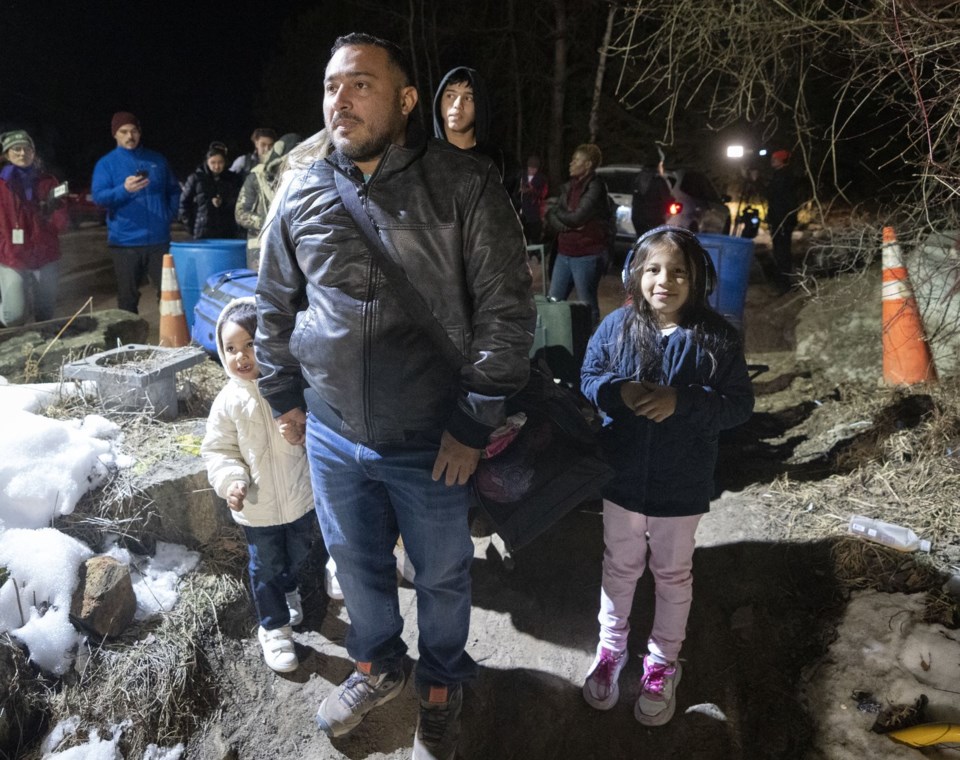OTTAWA — More than 300 civil society organizations are calling on the Liberal government to withdraw its new border bill, saying the legislation threatens liberties, refugee and migrant rights and the privacy of all Canadians.
Representatives of four major coalitions held a news conference Wednesday to ramp up pressure on Ottawa to scrap the proposed Strong Borders Act, also known as Bill C-2.
"We are unified in our opposition to this sweeping and dangerous legislation," said Karen Cocq, spokesperson for the Migrant Rights Network.
"Bill C-2 is not a border bill. It is a power grab and an attack on fundamental human rights and civil liberties."
The bill, introduced this month, would give authorities new powers to search mail, facilitate police access to personal information and make it easier for officials to pause or cancel immigration applications.
The federal government says the legislation is meant to keep borders secure, combat transnational organized crime, stop the flow of deadly fentanyl and crack down on money laundering.
Government House leader Steve MacKinnon told reporters on Wednesday the bill "will make its way through the parliamentary process, receive all due examination and we look forward to that debate."
The bill comes in response to sustained pressure from the administration of U.S. President Donald Trump, which cited concerns about the southbound flow of irregular migrants and fentanyl when imposing tariffs on Canadian goods.
The measures proposed in the bill have received support from Canada's police chiefs, the national fentanyl czar and child protection advocates.
The groups calling for the legislation's withdrawal say it would allow police and the Canadian Security Intelligence Service to demand to know whether a person has an online account with any organization or service in Canada.
They also warn the bill would permit authorities with a warrant to demand production of a person's online data, unencrypted emails and browsing history from a company based only on "reasonable suspicion" — not the current standard of reasonable belief.
"Bill C-2 is a multi-pronged assault on the basic human rights and freedoms that people across Canada hold dear," said Tim McSorley, national co-ordinator of the International Civil Liberties Monitoring Group.
The bill would strengthen the government's ability to cancel, suspend or stop accepting new immigration applications, and authorize Immigration Department officials to share client information, such as identity, status and immigration documentation, with provincial and territorial partners through agreements.
The legislation also would prevent someone who has been in Canada more than one year from seeking refugee status through an Immigration and Refugee Board hearing, even if their home country becomes dangerous after their arrival.
In addition, the legislation would eliminate a provision that allows people crossing from the United States into Canada between official ports of entry to apply for a refugee board hearing after 14 days.
The government says the proposed ineligibility provisions are not a ban on claiming asylum but will simply prevent those claims from being referred to the board. It says this will help avoid bottlenecks and allow the board to continue addressing new claims and the significant inventory of pending claims.
The government says that people affected by the ineligibility provisions may still apply for a pre-removal risk assessment to make sure they are not sent back to a country where they could face harm. It says the process will take into account each claimant's situation and may still result in refugee protection being granted.
Gauri Sreenivasan, co-executive director of the Canadian Council for Refugees, said that by driving claims away from the board and towards "the inadequate tool of a pre-removal risk assessment, the bill will merely shift the refugee backlog from one place to another" by passing the burden to an already strained Immigration Department and the Federal Court.
This report by The Canadian Press was first published June 18, 2025.
Jim Bronskill, The Canadian Press




